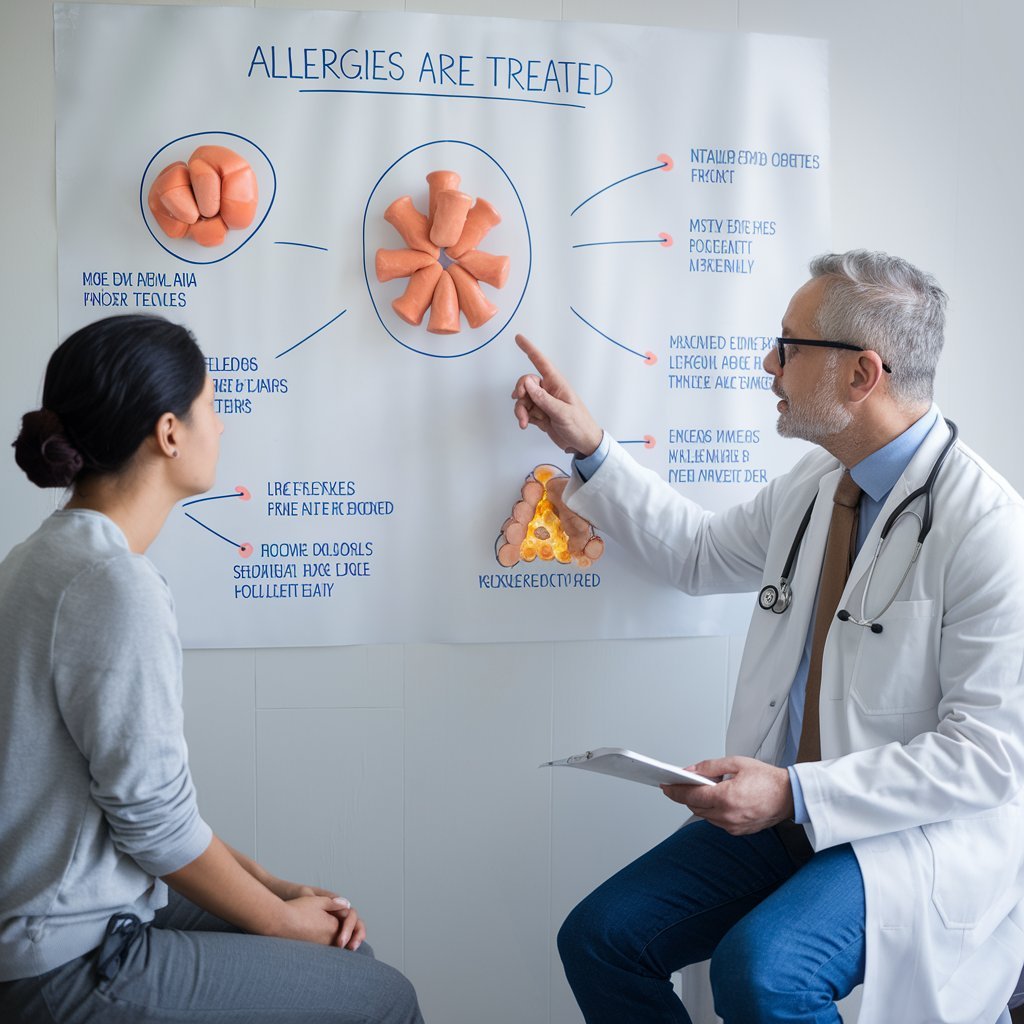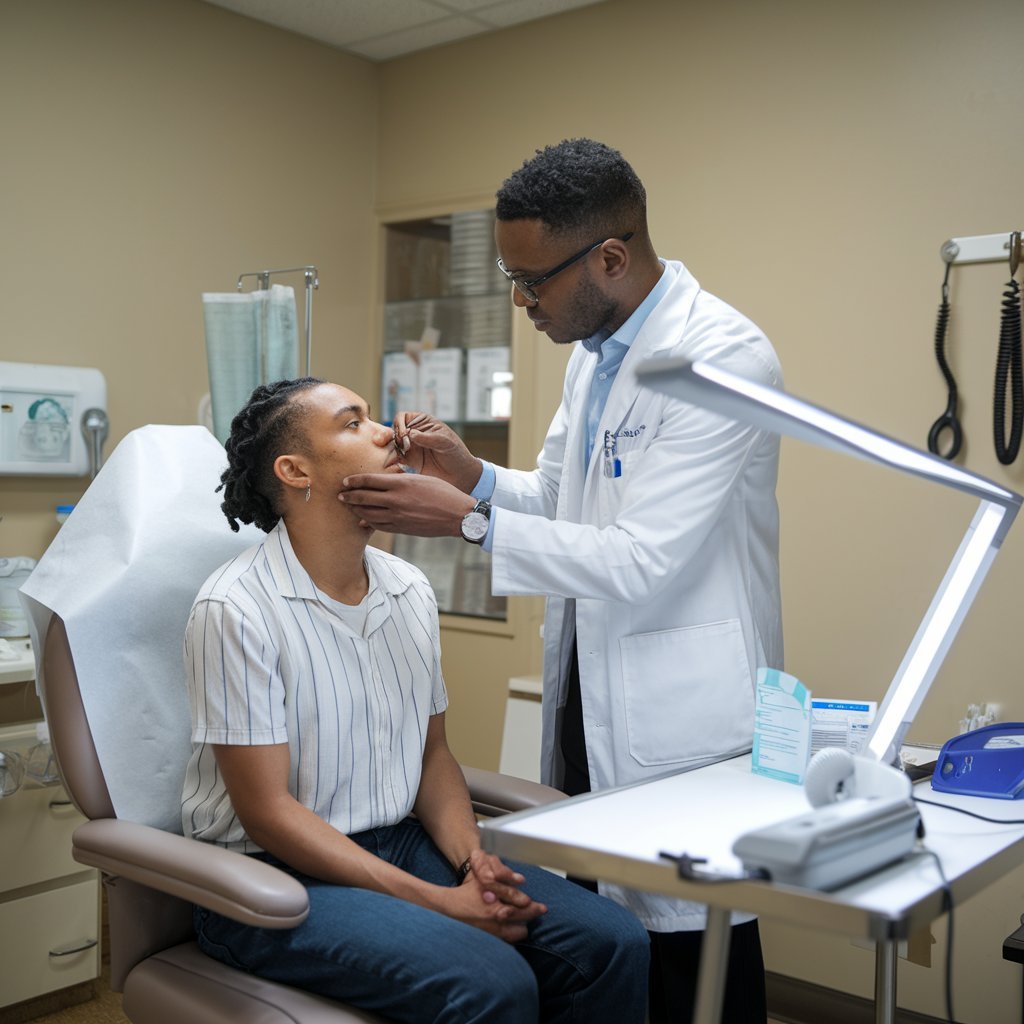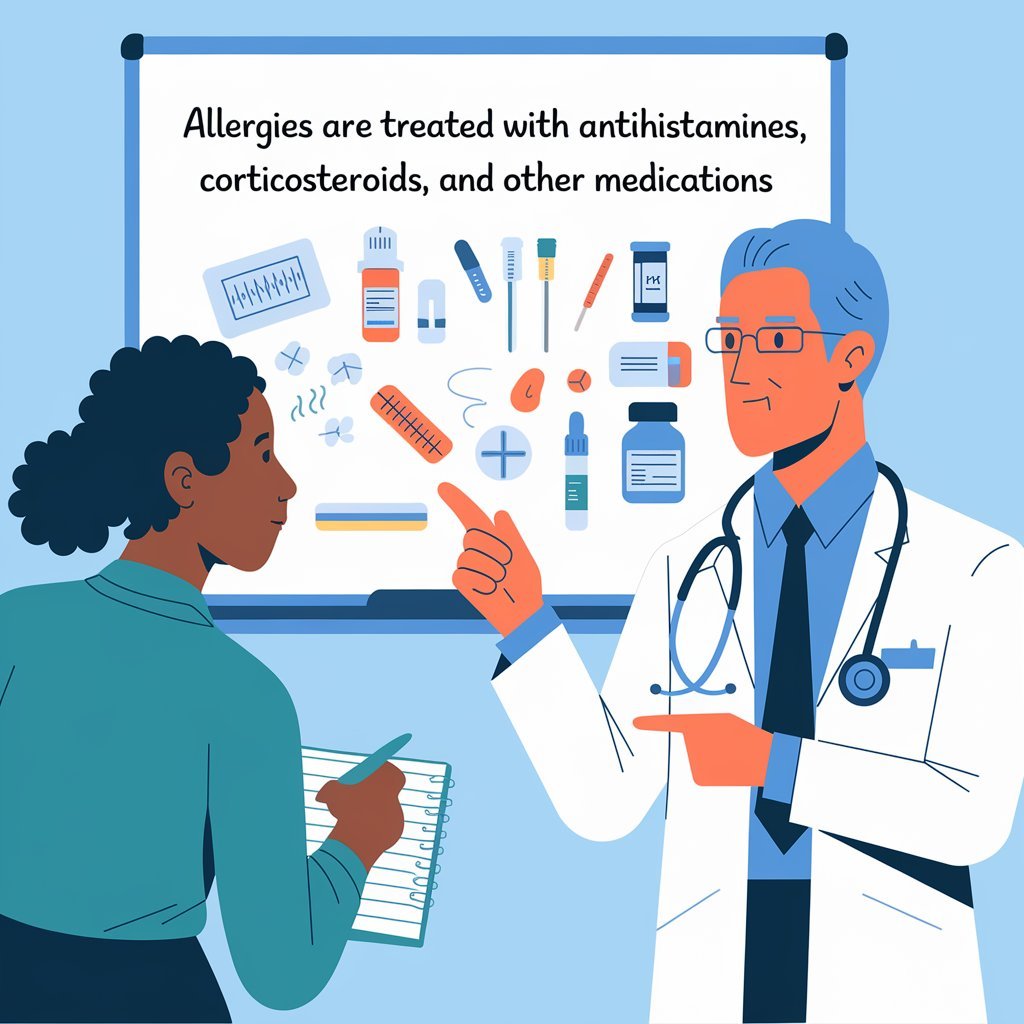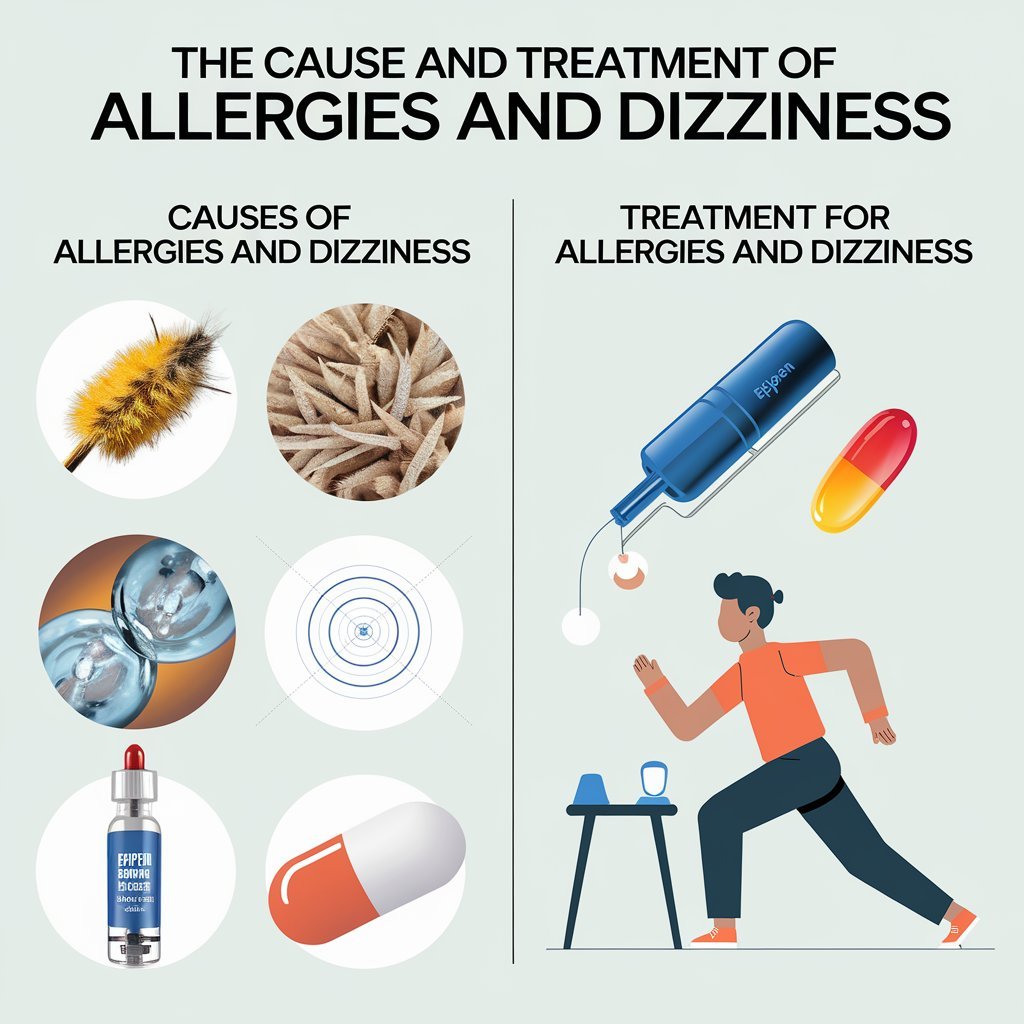Allergy treatments include lifestyle modifications to avoid allergens, medicines, and immunotherapy. Allergies, or allergic disease, occur when the immune system overreacts to an allergen or an ordinarily harmless foreign substance. Exposure to an allergen, such as pollen, animal dander, or certain foods, can cause symptoms like a runny nose or trouble breathing.
You may be referred to an allergist—a doctor with special training in diagnosing and treating allergies. The allergist will perform allergy testing to determine the specific allergens you are sensitive to and develop an effective treatment plan.

There is no known cure for allergies, so treatments are aimed at increasing tolerance to allergens, reducing exposure to them, and alleviating symptoms. Here’s everything you need to know about allergy treatments and how to live well when you have an allergic condition.
Medications
Allergy medications help decrease or eliminate symptoms. Prescription and over-the-counter (OTC) medications inhibit or reduce the body’s immune response to the allergen and alleviate symptoms.
Antihistamines
Antihistamines are the most commonly used allergy medication. They can be bought over the counter or by prescription, and antihistamines come in pill, liquid, nasal spray, and eye drop form.
Antihistamines block histamine, one of the chemicals released by the body when exposed to an allergen. These medicines alleviate symptoms such as runny nose, sneezing, itching, watery eyes, and hives. Antihistamines offer quick relief and may be used as needed or every day. They are most effective when taken daily prior to allergy season.
Corticosteroids
Corticosteroids alleviate allergy symptoms by reducing inflammation across the body. These medications are very potent orally but should be prescribed for short durations. Long-term administration can lead to severe side effects such as weight gain, osteoporosis, and sleeplessness
Creams or ointments: Topical corticosteroids treat allergies involving the skin that cause a reddish, itchy rash.Nasal sprays: Nasal corticosteroids are used for allergic rhinitis. These medications reduce the inflammation and swelling of the nasal passages.
Oral: Oral corticosteroids can be in pill, capsule, or liquid form and may be prescribed in the case of severe allergic reactions. This is not a first-line treatment and is only used in special circumstances.
Mast Cell Stabilizers
Mast cell stabilizers work by inhibiting the release of histamine by mast cells-white blood cells which are major mediators of the body’s response to allergens. Mast cell stabilizers come in the form of over-the-counter nasal sprays, eye drops, and prescription eye drops.

Mast cell stabilizers are most effective when used continuously and at least one week prior to the allergy season. Mast cell stabilizers help alleviate most allergy symptoms: stuffy nose, sneezing, postnasal drip, and red, itchy eyes.
Leukotriene Modifiers
Leukotriene modifiers are medications that inhibit the action of leukotrienes, chemicals produced by the body in response to an allergen. These chemicals cause inflammation, constrict the nasal passages, and result in allergy symptoms.
Leukotriene modifiers are often prescribed for people with asthma. These medicines are available as tablets for adults and chewable tablets and sprinkles for children. They are most effective when taken consistently at the same time every day.
Decongestants
Decongestants constrict blood vessels in the nasal passages that cause swelling and stuffiness.5 Most are available over-the-counter as sprays, tablets, capsules, or liquids.
Decongestants are a short-term-only medication because swelling and stuffiness worsen as time passes, and they cause blood vessels elsewhere in the body to constrict, which contributes to high blood pressure.
Epinephrine
Epinephrine is a prescription drug prescribed to manage serious allergic reactions also referred to as anaphylaxis. Anaphylaxis is very serious and life-threatening and may occur as a reaction to an allergen like food, medicine, or insect bite
Epinephrine is given as an injectable form; it is sold as an auto-injector device, also known as an EpiPen, AuviQ, or Twinject, which can be self-administered in emergencies. Epinephrine, the hormone also referred to as adrenaline, works in the following ways:
- Constriction of blood vessels
- Increased rate of heart beats
- Relaxation of smooth muscles in the lungs
People at the risk of having anaphylaxis should carry an epinephrine auto-injector and know its use.
Allergy and Asthma Foundation of America. Allergy treatments.
Epinephrine is highly effective in slowing or stopping an allergic reaction and can save a life.
Immunotherapy
Immunotherapy, or “allergy shots,” is a treatment that can be applied to patients who have chronic environmental allergies. Immunotherapy is an administration of small amounts of the allergen at first and increases gradually in amounts to alter the immune system’s response to the allergen, so you become less sensitive over time.
This allergy treatment is safe and effective in the treatment of allergies, and it is helpful for those whose symptoms do not respond well to other medications. The full benefits of immunotherapy can take several months or even years to be realized. It is not a cure, but it can greatly reduce symptoms and the need for other medications.
SCIT
SCIT, or allergy shots, is administered as injections. It may be given once or twice a week in an allergist’s office. Injections comprise tiny amounts of the allergens you are allergic to. Over six to 12 months, these allergens are gradually increased in dose to allow your immune system to build a tolerance to multiple allergens.

Once a tolerance has been established, the allergist can recommend that allergy shots be spaced further apart. Immunotherapy is stopped if there is no need for allergy medication and if symptoms of an allergic reaction have stopped.
Sublingual Immunotherapy (SLIT)
SLIT is a sublingual tablet that dissolves in the mouth below the tongue. It can be an option instead of allergy shots and used to help people overcome grass, ragweed, and dust allergies.
It is taken in the office of an allergist on the very first day. Most people take it at home thereafter. How long and how often your allergist recommends you continue oral immunotherapy will depend on the allergy you are trying to overcome
Complementary and Alternative Medicine
Many patients with allergies think about using complementary and alternative medicine (CAM) to help manage allergy symptoms. The safety and efficacy of many CAM treatments for allergies have not been well investigated, and most are not supported by scientific evidence.
While some CAM treatments may help alleviate allergy symptoms, they should not be used as a replacement for standard treatment. Allergists should always be consulted before using CAM treatments because some may interact with allergy medications and are not safe for everyone.
Saline Nasal Irrigation
Saline nasal irrigation is the flushing of the nasal passages (nostrils) with a saltwater solution. The solution can be installed with a nasal spray bottle, a neti pot, or a bulb syringe.
Saline nasal irrigation is done to clean out excess mucus and allergens, as well as other irritants in the nasal passage, which assists in relieving symptoms like congestion, runny nose, and sneezing during allergies, while also providing relief from irritating dryness in the nasal cavities.
Saline nasal irrigation is seen as a rather safe and also well-tolerated treatment with allergies. Relatively inexpensive compared to other procedures, it could be done right at home. So far, no side effects were reported, except for the sterile saline solution one must use while also cleaning their equipment properly for infections. 9Using tap water for nasal irrigation can also be dangerous.
Acupuncture
Acupuncture is a procedure in which thin needles are inserted into specific points on the body. It may help control allergy symptoms. Some studies suggest that acupuncture may help alleviate allergic rhinitis (hay fever) symptoms. More research is needed to confirm these findings and to determine the best way to use acupuncture for allergies.
Herbal Medicine
Some herbal supplements can alleviate symptoms of seasonal allergies; examples include butterbur and stinging nettle. However, quality and purity in herbal supplements can vary substantially and include contamination that can be toxic.
Consult with a health provider before ingesting herbal products to treat allergy if you wish to use such products. Make sure to obtain high-quality preparations from trusted companies
Probiotics
Probiotics are dietary supplements that contain live bacteria and yeasts that aid in showing a healthy gut microbiome. Some studies showed that probiotics might decrease the symptoms of allergic rhinitis, but much more research is required to confirm it.
Lifestyle
Besides your allergist’s treatment recommendations, some habits will help prevent or reduce allergy symptoms:
Control symptoms through avoiding allergens: The most efficient way of managing allergy symptoms is to stay away from allergens. In cases where allergens are linked to food or season, for example, avoiding going out in peak seasons and preventing allergenic food items may help, whereas proper dusting and vacuuming and removing carpet, besides the use of high-efficiency particulate air filters, will eliminate indoor allergens.
Consume a healthy and balanced diet. A diet with fruits and vegetables, adequate intake of vitamins, and minerals, can boost immunity and reduce inflammation. Drinking plenty of water hydrates the mucous membranes, flushing out the allergens inside the nasal cavities.
Stress management: Stress does not cause allergies, but high levels of stress can trigger the body to release histamines, hence aggravating allergy symptoms. Finding ways in which to relieve stress, such as deep breathing exercises, meditation, or journaling, can help with managing stress.
Living with and managing allergies can be challenging, but proper treatment can minimize symptoms and maintain a good quality of life. Treatment, including medications, immunotherapy, and lifestyle modifications, plays a significant role in managing allergies.
You can seek help from friends, family, and your healthcare provider to manage allergies and how they affect your life. Support groups and online communities can offer you a sense of belonging as others share your allergy conditions.
A Quick Review
Allergy treatments include medications, such as antihistamines, corticosteroids, and immunotherapy (e.g., allergy shots). Lifestyle modifications, such as limiting exposure to allergens, can also help manage allergies.
Managing allergies can be a lifelong process, but with the proper treatment and lifestyle modifications, people with allergies can lead healthy lives. An allergist can help develop an individualized treatment plan that works best for you.




